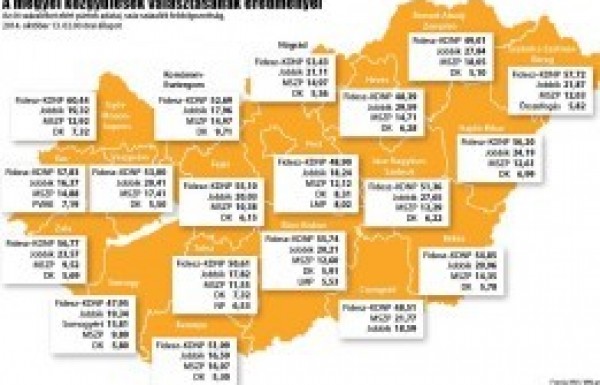
Municipal elections tend to be more grateful subjects for the spokespersons of losing national parties than parliamentary elections because there are hundreds or thousands of results, and victory and defeat are not necessarily clear. Even in the worst defeat, national parties can point to some local successes that redeem their efforts or at least qualify the totality of their defeat. The good news for the left is that the saving graces of 2014 are the same as the ones that gave it hope in 2010. And obviously that's also the bad news, for there was little to no progress for the left in October 2014.
Even though both the left and Jobbik received more votes than in 2010, the totality of Fidesz' victory was almost complete yet again. Three facts illuminate the overwhelming nature of Fidesz' success:
1) The governing party retains control of all county assemblies. Its majority is reduced almost everywhere - in several counties to a majority of one seat - but it remains a majority. Fidesz is in complete control throughout Hungary. As usual, Fidesz' majorities are more pronounced in the western half of the country.
2) Fidesz' has once again swept almost all major cities. In addition to Szeged, the left also won by 50 votes in Salgótarján, with a population of 37,000 by far the smallest of the socalled towns with a county level status, which tend to be the largest urban areas in Hungary. In sum: Fidesz retains overwhelming control of the major towns where the left's core political support used to be based outside Budapest.
3) In the capital, the mayor István Tarlós, the Fidesz-supported incumbent, was re-elected with a tally that was less impressive than previously expected, but imposing enough at almost 50%. Despite a weaker result than in 2010, Fidesz has also expanded its majority in the city council from 17-16 (10 MSZP, 3 each Jobbik and LMP) in 2010 to 20-13 (10 left-wing, 1 LMP, 1 Jobbik and 1 independent) in 2014, thanks also to the last-minute amendment of the municipal election law which - unlike the previous party list-based system - gives a huge edge to the party that wins most district mayoralties.
Policy Solutions' analysis can be downloaded from here.
Policy Solutions is a progressive political research institute based in Budapest. It was founded in 2008 and it is committed to the values of liberal democracy, solidarity, equal opportunity, sustainability and European integration. The focus of Policy Solutions’ work is on understanding political processes in Hungary and the European Union. Among the pre-eminent areas of our research are the investigation of how the quality of democracy evolves, the analysis of factors driving euroscepticism, populism and the far-right, and election research.
Follow us on Facebook!